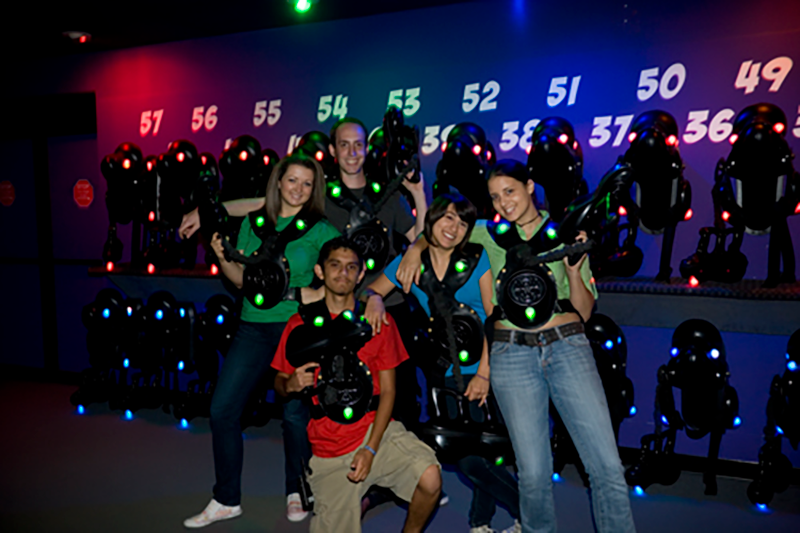Not Just Child’s Play
While family entertainment centers (FECS) have traditionally catered to birthday parties and family outings, they’re increasingly eyeing new business. That’s especially true as companies rethink their corporate retreats for safety reasons and plan smaller events closer to home. In lieu of the traditional golf outing or sporting event, salespeople can also bring their clients or prospects to an FEC. Funworld spoke with three FEC brands to discover how they are courting this market.

Identifying Corporate Group Needs
Scene75 has five locations spread across Ohio and Chicagoland. About 10% of its sales comes from corporate bookings. Earlier in the pandemic, the company’s sales and business developments spent a lot of time building up LinkedIn networks and making outbound calls to check on local companies. Now, that work is paying off.
“In 2021, we saw attraction revenue and food and beverage revenue return to those normal numbers, and then in [the fourth quarter], we’ve actually finally seen that company revenue return,” says Regional Sales Director Steph Dessecker. “It’s been really encouraging to see that group and company market returning.”
The marketing team also supports this effort by publishing content on LinkedIn and running campaigns through Salesforce. Each Scene75 location also held a holiday showcase in July, where company representatives were given game cards, invited to sample options from the buffet, and encouraged to book holiday events in advance.
What attractions are companies most interested in? Go-karts, Dessecker says, followed by laser tag and mini-golf. These outings can also include alcohol. “We have some folks who really want that team-building aspect,” she explains. “But we also have people who just want to come in and use one of our beautiful banquet spaces.” Banquet facilities can seat up to 500 people, and the staff handles all their audiovisual needs. Some company outings include family members, while others are just for employees.
After many companies went fully remote for a year or longer, Scene75 hopes to meet the pent-up demand for employee events. “They want to get back out,” Dessecker says. “I think with a lot of them working from home, it’s an opportunity for them to get in a building together and actually see each other.”
Elevating the Food and Beverage Menu
Before Tim Murphy became CEO, Boomers Parks was focused on ages 2 to 12. But when he noticed lots of tweens, teens, young adults, and corporate guests also enjoyed attractions such as go-karts and batting cages, he knew they needed to shift their focus. “Look at who you’ve got,” Murphy says. “If you’re targeting one thing, but that’s not who you’re rolling in, you’re going in the wrong direction.”
To appeal to a slightly older clientele, Murphy knew facilities needed better spaces for eating, drinking, and relaxing. “Let’s give them Boomers backyards,” he says. “Let’s give them chill zones. We created VIP areas with ceiling fans and TVs.” Companies can rent out VIP areas and get table service.
The color palette also changed. “What I found in my past was when colors were too bright or too flashy, it turned off HR (human resources) directors and turned off CEOs from bringing their businesses there,” Murphy explains. “So, you tone things down, make it a little more fun and relaxing.” The team settled on red and blue because they’re aiming to be “America’s FEC.”
Fries, hot dogs, and pizza are staples of FEC concessions, but Murphy wanted to upgrade these items so corporate groups could get the restaurant quality they wanted. Parents might also stay longer with better food. “Can we update the flavor profiles of the fries and pizza? So, we’ve gone to Korean barbecue, chili lime, and come up with all kinds of great desserts.” Every 12 months, Boomers plans to revamp the food menu to keep elevating it. The FECs had previously served beer and wine, but now they have a full alcohol menu.
They also eliminated season passes because Murphy felt those appeal to the bargain seeker, not the person who’s going to spring for premium food and beverage options. That approach seems to be working, as the average concessions check per person has increased $6 since 2019. Boomers also added an ax-throwing arcade game and is looking at adding virtual reality in the future.

Offering Special Promotions for Company Outings
Company bookings are a newer focus for Blazer Tag Adventure Center in Austin, Texas, since it added a bar/lounge area two years ago. To avoid the stiffness of the phrase “corporate bookings,” the FEC instead refers to these packages as “office shenanigans.”
Depending on the size of the group, companies can buy out the entire facility or host a smaller-scale event with other customers present. Amid safety concerns during the pandemic, private events have proven popular. “They have an opportunity to upgrade their games to private games exclusively,” says Joe Michael Ramirez, center and arcade manager. “So that’s been a huge help with us, too, as we are trying to reinvent the wheel with this whole pandemic.” About half of companies book private events.
Ramirez has built a database of businesses for outreach purposes. He’ll go to businesses and ask how many employees they have, then give away free game passes in exchange for contact details. “It literally only costs me pennies for the printing on the back of that card,” he says.
He keeps track of who has redeemed the game cards using a code. Then, he can send an email blast to those businesses. “I’ll put in a coupon code or something that says 10% off of holiday parties, and we’ll see who bites,” he adds.
Based on the company’s needs, Blazer Tag can offer an environment that’s purely fun or foster a more competitive spirit where departments compete against each other. “One of the managers takes one team, and then I’ll take another team, and we’ll coach them up, give some pointers,” Ramirez says.
These types of events not only foster teamwork, but also reward employees for their hard work. “I feel wholeheartedly that companies should treat their workers to a good time outside of the work environment,” Ramirez says, “because I’m a firm believer that happy workers work harder.”
- Susan Johnston Taylor is an Austin, Texas-based freelance writer who frequently covers small-business issues.
